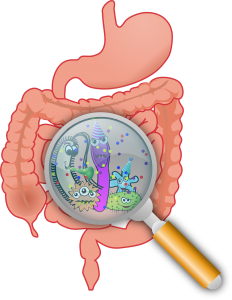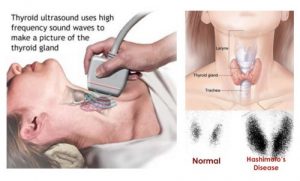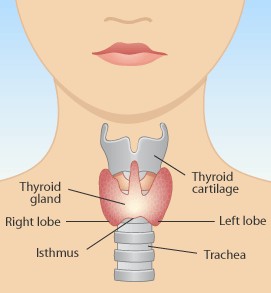Hashimoto’s disease, is also known as chronic lymphocytic thyroiditis or simply Hashimoto’s. This disease is a progressive autoimmune disorder where the immune systems attacks healthy tissue. It is also the most frequent cause of hypothyroidism (low thyroid function) and the most common cause of an enlarged thyroid (goiter). Hashimoto’s is also very prevalent in menopausal women, and women who live with high levels of stress. It is also the most common cause of hypothyroidism in developed countries.
It’s estimated that 90-95 % cases of hypothyroidism are actually Hashimoto’s disease. While this can be a challenging illness, lifestyle changes and a root cause approach are critical to recovery and remission of symptoms. Hashimoto’s is the most common cause of hypothyroidism in developed countries.
So What’s the Difference between Hashimoto’s and Hypothyroidism?
While both conditions involve an underactive thyroid, there are differences. Hashimoto’s is an autoimmune disease where antibodies react against the thyroid gland proteins, over time this can cause the destruction of the thyroid gland. Hypothyroidism is a condition where the thyroid gland isn’t producing enough thyroid hormones for a healthy body.

What Causes Hashimoto?
The origin of autoimmune diseases is multifaceted, it includes: genetic, environmental, hormonal, and immunological factors, all of which are considered important factors in the development of this illness.
So what factors can contribute to the risk of Hashimoto’s?
Gender. Women are more likely than men to get Hashimoto’s disease.
Age. While Hashimoto’s disease can occur at any age, it is more common during middle age.
Heredity. If family members have Hashimoto’s or other autoimmune diseases, you are in a higher risk category.
Other autoimmune disease. Having another autoimmune disease increases your risk of developing Hashimoto’s disease.
Radiation exposure. People who are exposed to excessive levels of radiation are at increased risk to Hashimoto’s disease.
Stress. Stress plays a significant role in autoimmune diseases. Both physical and psychological stress is implicated in the development of autoimmune disease. Additionally, many retrospective studies found that up to 80% of patients reported unusually high emotional stress before disease onset.

Hashimoto Signs and Symptoms
The symptoms for Hashimoto’s include symptoms associated with hyperthyroidism and hypothyroidism:
| Weight gain | Weight loss | Cold/heat intolerance |
| Fatigue | Pain | High cholesterol and High triglycerides |
| Dry skin | Brittle nails | Thinning hair |
| Fatigue | Apathy | Anxiety |
| Depression | Digestive issues | Constipation/Bloating |
| Muscle aches/tenderness | Swollen face, eyes, belly | Joint stiffness and swelling |
| Frequent urination | Excessive thirst | Low sex drive |
| Frequent colds, illness | Menstrual cycle irregularity | Infertility |
| Memory problems | Slowed heart rate |

Tests for Hashimoto’s
Unfortunately for many people Hashimoto’s isn’t usually discovered until it is in its advanced stages. This may be due to traditional medical testing of TSH levels, unfortunately this test won’t show elevated numbers until stage 4. There are other tests available that can reveal thyroid disease up to ten years before elevated TSH would be detected. The two most helpful tests for diagnosing Hashimoto’s include thyroid antibody tests (TPO and TG antibodies) and thyroid ultrasounds.
Detecting this condition in its earlier stages would allow for minimal symptoms, minimal tissue damage and the ability to make the necessary changes to diet and lifestyle that are needed to treat the root cause, rather than simply manage symptoms.

Stages of Hashimoto’s
Stage 1:– You have a genetic predisposition to the illness, but haven’t been exposed to the “triggers” to create changes in your thyroid function. At this point you have “normal” TSH, T4/T3 hormones and no thyroid antibodies.
Stage 2: Immune Cell Infiltration of the Thyroid Gland-In this early stage of Hashimoto’s, elevated thyroid antibodies will turn up. In fact up to 80-90% people may show an elevation of thyroid antibodies when tested in blood, thyroglobulin antibodies, and thyroid peroxidase antibodies. This stage can literally go on for decades before enough damage is done to show a change in thyroid hormone levels on a traditional blood test.
While 80-90% of individuals with Hashimoto’s will test positive for TPO antibodies, TG antibodies or both, others will not and yet still have full blown Hashimoto’s.
Stage 3: The next stage is known as subclinical hypothyroidism. At this stage lab tests may show slightly elevated TSH (3-10), and the levels of free T3 and free T4 are going to be normal. As inflammation of the thyroid gland increases, the person’s thyroid antibodies may be even higher than what would show up in Stage 2. This can be a controversial stage as traditional medicine, may take a wait and see approach. If however you do nothing during this stage then symptoms will increase and likely progress to overt hypothyroidism.
Stage 4: This is the beginning stage of thyroid failure. The thyroid can be destroyed to the point that it is unable to make thyroid hormones. This is commonly the stage at which many people are diagnosed. In order to prevent serious consequences thyroid medications will be recommended.
Stage 5: Hashimoto’s puts individuals at risk for developing other autoimmune diseases such as Sjogren’s, celiac disease, rheumatoid arthritis, multiple sclerosis, lupus and many others illnesses.
Sadly, this is the natural progression of the autoimmune response, if it is left unbalanced it may find additional body tissues or glands to attack.

Complications of Hashimoto’s
As mentioned in stage 5, Hashimoto’s increases your risk of developing other autoimmune disorders. Some examples include:
| Addison’s disease | Grave’s Disease | Type 1 diabetes |
| Pernicious anemia | Vitiligo (irregularity in skin pigmentation) | Multiple sclerosis |
| Autoimmune hepatitis | thrombocytopenic purpura (difficulty in bloods ability to clot) | Celiac disease |
| Rheumatoid arthritis | Lupus | Sjogren’s disease |
Treating Hashimoto’s Conventionally
Thyroid medications are traditionally given to a patient when their thyroid has little to no function. While taking medication may help, it does nothing to actually prevent the disease from progressing, nor does it treat the underlying conditions that are causing the autoimmune reaction.
Remission
While there is not technically a cure for Hashimoto’s, you can go into remission by eliminating the triggers and recovering your health by addressing food sensitivities, gut issues, nutrient deficiencies, eliminating toxins, reducing stress and healing chronic infections.

Natural Help
Dietary and lifestyle changes are a necessity in effectively treating the symptoms of Hashimoto’s. Nutritional therapy includes an immune boosting diet full of fresh vegetables and fruits. Avoiding “goitrogens” foods which inhibit your body’s use of iodine, foods such as cabbage, turnips, peanuts, mustard, millet, tempeh and tofu. Cooking these foods however inactivates the goitrogens.
In order for your body to recover, you need to remove all stressors from your body, this includes physical and emotional stress. Normalizing the immune system and reducing inflammation and allergens is key.
Examine Your Diet for Foods That Cause Your Immune System to Overreact
What you eat has a major impact on your health. As Ann Wigmore used to say:
“The food you eat can be either the safest and most powerful form of medicine or the slowest form of poison.”
Evaluate your food choices. Are you eating foods that are causing inflammation in your body? Do you have food sensitivities or food allergies? It’s important to work on healing your gut, as leaky gut frequently precedes the development of Hashimoto’s. While food lists vary based on individual food issues, you want to avoid foods that cause inflammation and allergic reactions. Work with your doctor/practitioner to determine an appropriate elimination diet for you, based on your complete medical history.
Important factors to consider are gluten, nightshades, sugar, grains and processed foods as these are foods that commonly cause inflammation and food sensitivities or allergies.

Add Gut Healing Foods
Eating whole, organic foods that are nutrient dense and free of additives. Incorporate:
| Bone broth | Sprouted seeds & legumes | Wild caught fish |
| Probiotic rich foods | Fresh veggies & fruit | Coconut oil |

Add Supplements:
Work with your doctor/practitioner to determine what supplements your body needs to repair, rebuild and nourish.
Vitamin D-90% of patients with thyroid disease are vitamin D deficient.
Probiotics-This will help to balance microflora in your gut and help to build immunity.
Selenium-Helps regulate T3 and T4 hormones. The thyroid has the highest selenium content per gram of tissue.
Be careful with iodine-Excessive use of iodine can trigger Hashimoto’s symptoms and in some cases make them worse, especially if an individual is also deficient in selenium.
Avoid soy-Most soy is genetically modified and is likely to contain high amounts of glyphosate. It also has goitrogenic effects, (goitrogens inhibit thyroid function). Soy also contains phytic acid which can lead to a decrease in the body’s ability to absorb iron and calcium.
Magnesium-The thyroid gland needs magnesium to utilize iodine. Studies have also found that magnesium citrate can help to lower elevated TSH levels.
B Vitamins-B12 in particular is important for fighting fatigue and maintaining energy levels. This clinical study published in the Journal of Alternative and Complementary Medicine, showed the majority of patients with Hashimoto’s experienced complete elimination of fatigue within a few hours or days!
Ashwagandha-This adaptogenic herb helps to balance T4 hormones, as well as increasing your ability to handle stress.
Conclusion
Hashimoto’s disease is also known as chronic lymphocytic thyroiditis or simply Hashimoto’s.
This disease is a progressive autoimmune disorder where the immune systems attacks healthy tissue.
It is also the most frequent cause of hypothyroidism (low thyroid function).
The two most helpful tests for diagnosing Hashimoto’s include thyroid antibody tests (TPO and TG antibodies) and thyroid ultrasound.
You can go into remission by eliminating the triggers and recovering your health by addressing food sensitivities, gut issues, nutrient deficiencies, eliminating toxins, reducing stress and healing chronic infections.
Remove foods that cause inflammation in the body such as dairy, gluten, sugar, nightshades and grains.
Support the body with gut healing foods
Supplement the body with probiotics, herbs and nutrients.








